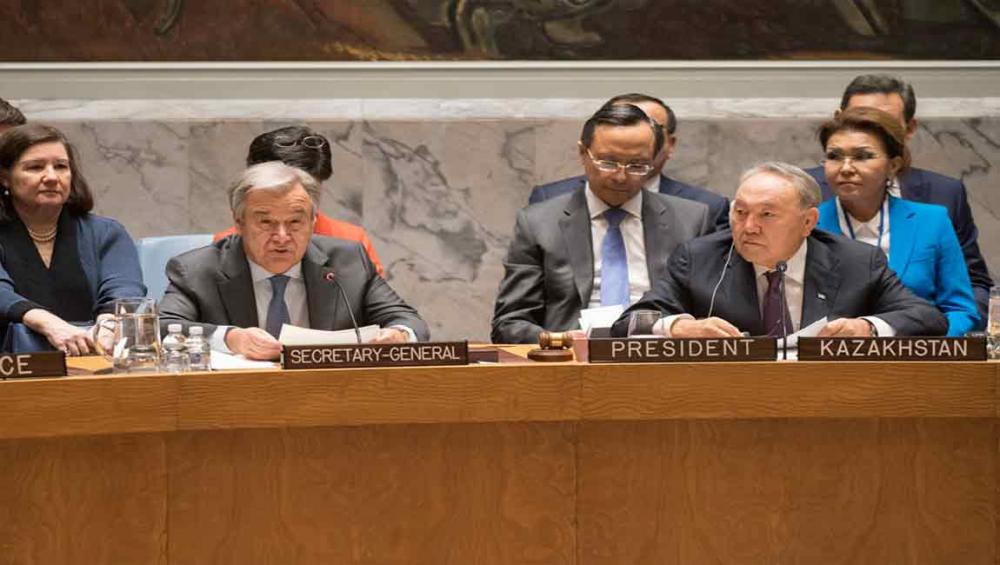Just Earth News | @JustEarthNews | 20 Jan 2018, 04:57 pm Print

Eskinder Debebe
New York, Jan 19 (JEN): Worldwide concerns over nuclear weapons are the highest they have been since the Cold War, United Nations Secretary-General António Guterres said Thursday, calling for comprehensive political solutions that include dialogue and negotiation to prevent, mitigate and resolve conflicts.
In cases involving weapons of mass destruction, “verifiable disarmament and non-proliferation” efforts are critical, stressed the UN chief, speaking alongside Nursultan Nazarbayev, the President of Kazakhstan, at a high-level briefing in the Security Council on non-proliferation of weapons of mass destruction.
However, warning that confidence can be undermined by “bellicose rhetoric, confrontational approaches, the absence of communication channels, and inflexible positions,” Guterres underscored the importance of effective verification mechanisms.
“From the ground-breaking verification protocols of the Strategic Arms Reduction Treaty, to the invaluable work undertaken by the International Atomic Energy Agency (IAEA) and the Organisation for the Prohibition of Chemical Weapons (OPCW), verification builds confidence,” he said.
In his remarks, the Secretary-General also expressed his belief that UN can play a central role in assisting its Member States to develop, augment and support confidence-building measures and that its position as an “honest broker” allows it to serve as a venue in which all parties can engage in dialogue.
The UN’s position as an “honest broker” allows us to act as a venue in which all parties can engage in dialogueSecretary-General Guterres
“Going forward, the Security Council, in particular, can provide leadership by demonstrating unity and continuing to highlight the importance of dialogue and diplomacy as an essential means for building confidence,” he said, adding that a measure all Member States can undertake is the universal and complete implementation of all disarmament and non-proliferation obligations.
Guterres went on to welcome the reopening of inter-Korean communication channels, especially the military-to-military one, and said that it is critical to lower the risk of miscalculation or misunderstanding and to reduce tensions.
“I am also encouraged by the decision of the Democratic People’s Republic of Korea (DPRK) to participate in the upcoming Winter Olympics in the Republic of Korea,” he said, calling for expansion of diplomatic efforts to achieve the peaceful denuclearization of the Korean Peninsula.
At the same time, he added, that the firm decisions the Security Council taken in response to nuclear tests and ballistic missile launches by the DPRK in defiance of Council resolutions must be fully implemented.
Unity within the Security Council vital
The UN chief also highlighted the importance of the Joint Comprehensive Plan of Action (JCPOA) on the Iranian nuclear programme and said that multilateral agreement, which is in the interest of the Iranian people and the international community at large, should be preserved.
Turning to the Syrian conflict where the use of chemical weapons has challenged the “global taboo” against these weapons of mass destruction, Guterres said that if the use of chemical weapons in the country is once again determined, the international community “needs to find an appropriate way to identify those responsible and hold them to account.”
“Without such an avenue, we are allowing the use of chemical weapons to take place with impunity,” he stressed urging for unity within the Security Council on the issue.
The Security Council meeting on Thursday on the theme of non-proliferation of weapons of mass destruction: confidence-building measures was convened by Kazakhstan in its capacity as the President of the Security Council for the month of January.
Later in the day, Guterres met with President Nazarbayev, and commended Kazakhstan on the agenda of its Presidency in the Security Council, as well as its constructive cooperation with the United Nations, including the UN Regional Centre for Preventive Diplomacy for Central Asia (UNRCCA).
According to a UN spokesman, the two discussed developments in the region as well as the Astana Process [Syrian peace talks led by Iran, Turkey, and Russia in the Kazakh capital], while underscoring the lead role of the Geneva political process [of intra-Syrian talks].
The Secretary-General also expressed condolences to the families of the victims of on Thursday’s bus fire in Kazakhstan. According to reports, some 52 people were killed after a bus they were travelling in caught fire in Kazakhstan’s north-western Aktau region.
- IDF strikes Hezbollah targets in Lebanon after projectile fire toward Northern Israel; 31 killed
- Pakistan: Armed gunmen kidnap 14 workers during coordinated raids in Balochistan
- ISIS-inspired plot foiled in UK: Two men get life sentences for targeting Jewish community
- India rejects allegations, urges Pakistan to tackle its ‘home-grown ills’
- Massacre in Islamabad: ISIS takes responsibility for deadly Pakistan blast





-1763561110.jpg)
